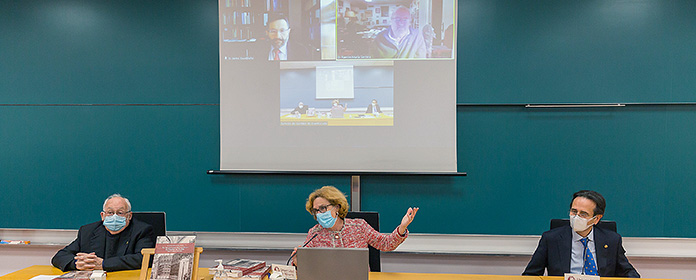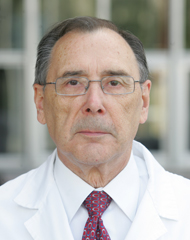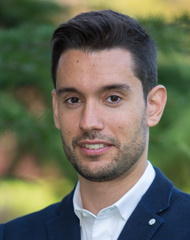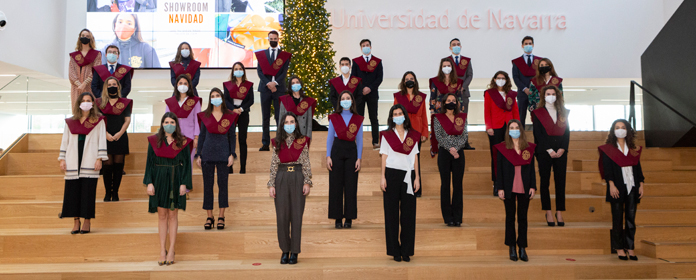"There is no difference between men and women working in science, except when women decide to become mothers.
Silvia Vega-Rubín-de-Celis (Biology99, Biochemistry 00) is a cancer researcher at the German Cancer Research Center (Heidelberg). From there, she rejects quota policies while advocating for a true conciliation of research interests.
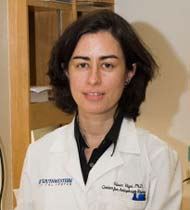
PHOTO: Courtesy
Silvia Vega has worked -since graduating in Biology and Biochemistry at the University of Navarra- in the USA and Germany. In the latter country she has managed to establish herself in a laboratory that gives her "autonomy and resources to dedicate herself to research in cancer".
This "pilgrimage" between Europe and America was initiated with her husband, also a scientist. Both have managed to consolidate their degree program and start a family without giving up either of their two aspirations. She admits that it has not been easy, and assures that there is still a long way to go so that women scientists do not see their role as mothers curtailed.
Achieving this balance is not a question of quotas, he says, but of measures that result in a real reconciliation of family and work life.
- Silvia, how did you start your degree program after Degrees in Biology and Biochemistry ?
After graduating I considered several career options. It was clear to me that my vocation was research, and in the end I chose to do a doctoral thesis at the CSIC. Afterwards I have been fortunate to be able to focus, in the end, on various aspects of cancer molecular biology.
- What was your topic in the doctorate? And in the current postdoc?
I did my doctorate at CSIC on hormonal cycles in fish. Subsequently I decided to dedicate myself to the research in cancer. After a transitional year at the Dana Farber Cancer Institute (Harvard Medical School), I went to the University of Texas Southwestern Medical Center (UTSW), in Texas (USA) where I have worked on several projects. The most recent one, published in PNAS, has focused on autophagy (a process that allows the cell to obtain energy and is also related to cancer and other pathologies), and how agents that modulate its activity could possibly be used as a treatment in a subtype of breast cancer. This work has brought me, since August last year, to one of the German cancer research centers (the DKFZ).
- Why did you choose your current center for your postdoc?
The German Cancer Research Center (DKFZ) has given me the possibility to continue my lines of research in Europe. In addition, it is a center that performs interdisciplinary and translational research in cancer in close partnership with the clinic. With all this, they have provided me with independence, scientific level and first class facilities to develop my projects.
- With the experience you have already accumulated, how do you value the training you received in the Degrees of Biology and Biochemistry at the University?
The university training is the basis for the subsequent professional degree program . I think that at the University of Navarra many fundamental aspects are developed, such as the training internship and the possibility of choosing subjects of free choice that allow to adjust the programs of study to the interests of each student.
- As a woman and scientist, we wanted to talk to you about an initiative that our students from Degree have called Women for Science and Technology and that tries to promote a suitable environment for young women to develop their careers and to have close female references in the world of science. Have you noticed an advance in this area since you finished the Degree? Is it a topic overcome in countries like Germany ?
I did not know about this initiative of the University. I think it is an excellent idea and I am willing to collaborate with it. Personally, I think that there is no difference between men and women in the programs of study undergraduate or graduate programs. However, this divergence does become palpable at the moment when women decide to have children. I believe that not much progress has been made in this area.
On the other hand, I do not agree with agreement with those policies that give priority to women simply because they are women. Or those that impose quotas of 50% men and 50% women in all areas. I don't think that helps us, because it will always be questioned whether we have reached a certain position because of our worth or because we have filled a certain quota.
What I do support is that there should be more facilities to reconcile work and family life; such as improving childcare services or extracurricular activities, as well as taking into account the periods of leave maternity at curriculum. I am fortunate to be married to another scientist who understands my status perfectly. We have two children and we share the household chores, which makes everything more manageable.
At final, we must be aware that the development of the degree program professional for a woman should not mean having another work at home or giving up being a mother to focus on her field. The solution lies in being able to adequately combine work and family life.


